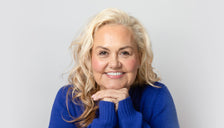The women in my family have featured heavily on here at times, with the notable exception of my paternal Grandmother, pictured above.
When my Nana died from cancer in 1986 she left a gaping hole in all of our lives. It was my first real experience of intense, searing, grief, and as anyone who has experienced such pain will attest to, it never leaves you. Every family gathering, every time we all meet up, she is noticeably absent. She never met my husband, nor her great-grandchildren.
If my glorious, hysterically funny, beautiful, happy Grandmother had gone for a cervical smear earlier, she may still be here. Maybe not, but we will never know, because she died when she was 60 years old, from cancer that originally started in her cervix.
I met up with The Eve Appeal again this week to discuss an upcoming project I am involved with, to be told that not only has the uptake of smear tests decreased since the introduction of the HPV vaccine, but that there is still some stigma around the vaccine itself.
It would appear that somewhere along the way, the message that there is a vaccine available that can help prevent some cervical cancers, is translating either into 'we don't need to get tested', or 'my daughter doesn't have sex, she's too young'.
This is not the case. Please, please, read the facts below, and for the love of sanity, if you have a cervix, keep up to date with your smear tests. If you are receiving reminders, make the appointment. If you have any unusual symptoms, please do not dismiss them. Make an appointment.
If you have a teenage daughter, sign the consent to let her have the vaccine. It does not mean she is a slut, it means you are being a grown-up and acknowledging that one day, unless she turns into Julie Andrews and joins a convent, she will have sexual contact with someone else. One day. Most of us do. It's a normal human thing to do. Get rid of the stigma.
Have the vaccine, have your smear tests. Take care of your Lady Garden people.
Being 'coy', 'shy' or just plain embarrassed, could literally be the difference between life and death.
HPV:
• HPV is a very common virus. Up to 80% of people will be infected with a HPV infection at some time during their lives.
• There are over 100 different types of HPV. Around 40 types of HPV affect the genital area, of which 13 of those can cause cancer (high-risk HPV).
• In women, high risk HPV can cause: cervical, anal, vulval, vaginal and some head and neck cancers.
• Girls in Scotland are routinely vaccinated against HPV from aged 11, whereas the rest of the UK routinely vaccinates girls from ages 12 – 13; up to their 18th birthday.
• Your very first sexual experience may put you at risk of infection.
• You are still at risk of contracting HPV even if you do not have penetrative sex as the virus is transmitted through genital skin-to-skin contact.
• Infection with HPV does NOT imply either infidelity or promiscuity.
• If you get high-risk HPV you will not require treatment nor will your partner. However, if your cervical screening test detects abnormal cells and high-risk HPV you may be sent for further examination.
• For younger women who are eligible, the HPV vaccination helps reduce risk. It protects against four types of high risk HPV that cause 70% of all cervical cancers.
• The immune system can help your body to clear an HPV infection. Yet, smoking can make it harder for the body to clear HPV.
• HPV vaccine is 98% effective in preventing cervical abnormalities associated with HPV in those women who have not yet been infected with HPV.
• Despite the fact that the vaccine cannot protect women from existing HPV infections, it can prevent reinfection.
• The body can clear the HPV virus naturally, but when seen on a smear, the next smear test done is called a “test of cure” to make sure the body has cleared the HPV virus away.
• The HPV vaccines are not a substitute for cervical screening. Having the vaccine reduces the risk of developing cervical cancer; however, it does not protect against all cervical cancers. Therefore it is vital that when invited to attend cervical screening that you do so.
Cervical screening:
• It is NOT a test for cervical cancer, it is a screening test to detect abnormalities in the cells of the cervix at an early stage, which if left untreated may develop into cervical cancer.
• Between 90 and 94% of all screening results are negative.
• Cervical screening saves 5,000 lives a year in the UK.
• Having regular cervical screening offers protection against developing cervical cancer
• A total of 4.31 million women aged 25 to 64 were invited for screening in England in 2014-15 and 3.12 million women were tested, representing a fall of 3.3% from 2013-14.
• Cervical screening can prevent around 45% of cervical cancer cases in women in their 30s, rising with age to 75% in women in their 50s and 60s, who attend regularly.
• Around a quarter (24%) of cervical cancer cases in England are detected by screening.
• In England, Northern Ireland and Wales; women aged 25–49 are invited every 3 years for a cervical smear and women aged 50–64 are invited every 5 years. Whereas in Scotland, women aged 20–60 are invited every 3 years. However this is due to change on 1st April 2016 to conform with the other countries eligibility criteria.
For more information on The Eve Appeal, go here: www.eveappeal.org.uk
Read Karen's story: www.independent.co.uk/if-i-had-let-the-stigma-of-cervical-cancer-stop-me-seeing-a-doctor-then-i-could-be-dead-by-now
And her blog: quarterlifecancer.com

































